MercoPress. South Atlantic News Agency
Tag: Parana River
-
Thursday, September 14th 2023 - 10:47 UTC
Paraguay said to have recognized Argentina's right to charge tolls along Paraná Waterway

Argentina's Energy Secretary Flavia Royon said Wednesday that Paraguay had recognized her country's right to charge a fee (toll) to barges sailing along the Parana River Waterway and that the issue at this point was to discuss the price, for which a technical commission will be instated to assess the crossed claims between the neighboring countries for debts related to the Yacyretá Binational Entity (EBY).
-
Tuesday, September 5th 2023 - 10:50 UTC
Argentina tightens security along Paraná Waterway
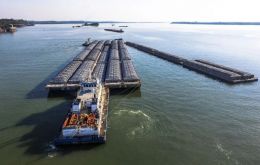
Citing security concerns and possible drug trafficking, Argentine authorities have upped their controls on Paraguayan barges sailing through the Paraná River, it was reported in Buenos Aires.
-
Thursday, August 31st 2023 - 09:21 UTC
4 countries against Argentina collecting tolls on Paraná Waterway
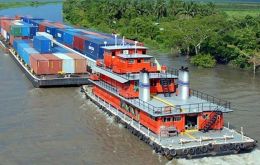
Paraguay, Brazil, Bolivia, and Uruguay insisted Wednesday on their objections to Argentina collecting tolls on the Paraná River Waterway and demanded the latter to halt that practice until it demonstrates services effectively rendered to navigation justify the measure.
-
Monday, August 21st 2023 - 09:49 UTC
Paraguay's new FM faced with further waterway negotiations
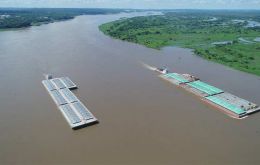
Paraguay's new Foreign Minister Rubén Ramírez met last week with representatives of the Paraguay-Parana Waterway Agreement Committee (CPTCP) to discuss the next steps toward the elimination of the toll of US$ 1.47 per ton of net register to river transport circulating through the “Port of Santa Fe-Confluencia” section unilaterally imposed by Argentina.
-
Wednesday, August 9th 2023 - 10:26 UTC
Brazil questions Argentina charging tolls on Paraná Waterway
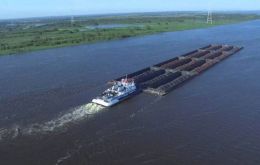
Brazil's Foreign Ministry Tuesday said Argentina charging tolls since the beginning of the year to barges sailing along the Paraguay-Paraná Waterway had affected other countries in the region and questioned the legality of the one-sided measure, Agência Brasil reported.
-
Tuesday, August 1st 2023 - 10:16 UTC
Brazilian traders want federal gov't involved in Paraná River Waterway toll dispute

The Brazilian Association for the Development of Inland Navigation (Abani) requested the Brazilian Foreign Ministry takes steps after the Argentine decision to seize a vessel of a Brazilian company in Greater Rosario due to debts in the payment of tolls for using the Paraná River waterway, it was reported.
-
Thursday, June 22nd 2023 - 10:47 UTC
Argentina did nothing to charge toll, Paraguay's Waterway Commission finds
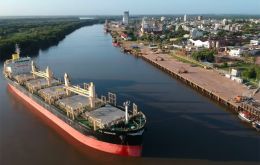
Paraguay's National Waterway Commission concluded that Argentina's technical explanations for charging tolls to vessels sailing through the Parana River between the Port of Santa Fe and the Confluence with the Paraguay River were inadequate and that there was no justification for such a unilateral measure, it was reported in Asunción.
-
Monday, January 16th 2023 - 19:21 UTC
Opening of Itaipu floodgates might relieve Paraná River downspout
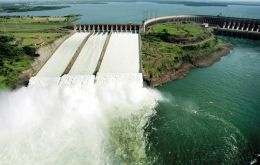
The opening of the floodgates at the Itaipú dam during the weekend is expected to bring some relief to the people along the Paraná river shores after 2023 also started with a downspout, although not quite as severe as in previous years.
-
Wednesday, December 21st 2022 - 10:22 UTC
Abundant rainfall in central Brazil helps Paraná River recover navigable level
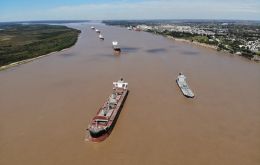
After years of forcibly lighter shiploads due to the intense down flow of the Parana River, the water level has begun to grow again, especially in the last couple of months. Thus according to the Rosario Grain Exchange, the average shipload of vessels sailing upriver rose 21% in two months and stood at more than 38,000 tons in November. Furthermore, the current water level is 23% above November last year and 19% above the November 2020 average.
-
Thursday, November 10th 2022 - 10:10 UTC
Paraguayan foreign traders concerned over Waterway toll
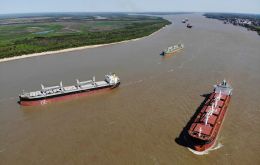
Officials and exporters in Asunción continue to object to Argentina's announcement that shipments through the Paraná River Waterway will have to pay a toll, which would generate an extra cost of 7%.
